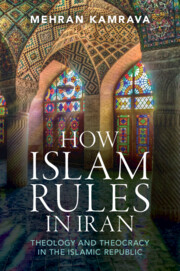Refine search
Actions for selected content:
2 results
1 - Introduction
-
- Book:
- How Islam Rules in Iran
- Published online:
- 02 May 2024
- Print publication:
- 09 May 2024, pp 1-10
-
- Chapter
- Export citation

How Islam Rules in Iran
- Theology and Theocracy in the Islamic Republic
-
- Published online:
- 02 May 2024
- Print publication:
- 09 May 2024
